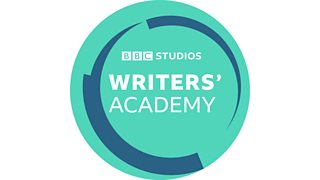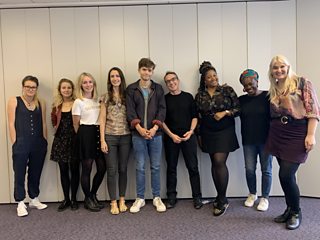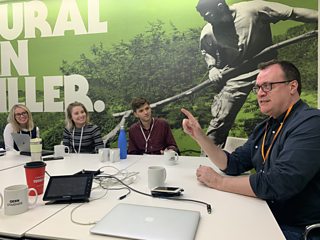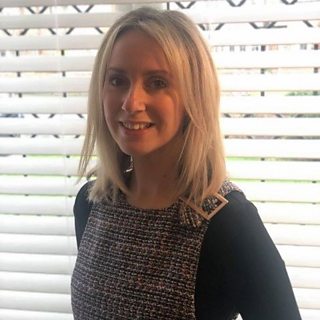is one of the writers who are part of the current . The dates to apply for the next Academy have just been announced. We asked Kellie to explain what it involves.

Can you tell us about some of your previous work?
I’ve worked in theatre, film and radio. Attachments with , and the . Recent theatre credits have been my play Wilderness at and The Monstrum for . I’ve written three afternoon plays for 主播大秀 Radio 4 and two films and . I’m currently working in a writers room with Sky.
What was it that appealed to you about the 主播大秀 Studios Writers’ Academy? Did you have experience of writing television before?
Over the past couple years I’ve had the opportunity to work on two films, which allowed me to make new connections in film and television. However, I’m still a fairly newbie when it comes to screenwriting and I wanted more practical television writing experience. The 主播大秀 Studios Writers’ Academy gives you the opportunity to write for these huge primetime shows whilst learning about all the constraints and possibilities of the development process. The added offer of getting to work with a 主播大秀 Studios affiliated independent production company on our own original idea felt like a hugely exciting prospect too.
How did you find out about the 主播大秀 Studios Writers’ Academy and what was the process of applying?
I think perhaps my agent, Julia Mills, had first mentioned it, but then a producer Luke Fresle came to see my play at Hampstead and encouraged me some more. As well as sending in our original work, we also had to pitch a storyline for an existing character.
I was then invited to a workshop, which initially I imagined would be a big room full of people, only to find myself sat round a small table of about eight people and John Yorke (they’d broken the long-list down into small groups to work with throughout the week). There was no hiding in that room, and you were quickly exposed if you were not up to date on any of the soaps and storylines. I felt pretty certain by the end of it that I was not getting a call back! But I then received the shortlist email and was invited to interview.
I made sure that I really watched, researched and had an opinion on all of the shows from then on. We also had to verbally pitch our own original series. A few days later, I was thrilled to get the email inviting me on the course.

The current writers in the 主播大秀 Studios Writers' Academy with John Yorke
What knowledge did you have to demonstrate with regard to your chosen show or other 主播大秀 continuing dramas? Have you been a viewer for a long time?
Well that first interview workshop with John involved a pop quiz on all of the soaps with very difficult questions! I have to say that I didn’t fare well with that. In all honesty I’ve dipped in and out of the soaps over the years, but in preparation for interview I completely absorbed myself in them again. A lot of the questions we were asked were about what we loved about them but also what we felt were their weaknesses, so a real understanding of their histories and the state of play today was important.
The course itself gives you a really thorough insight into the way these shows are constructed and how they differ. And of course, you have to keep up with watching them all! I am of course a truly avid viewer these days.
Once you found out you’d gained a place on the Writers’ Academy what happened next? What is the format of the academy?
Once I began to receive details of the course, I realised what a huge commitment and undertaking it was going to be. It’s important to note, in my case, I have two small children and I soon realised that I would have to relocate to London (I’m Liverpool based) Monday-Friday for the first three months. This was a big ask, and I’m lucky to have a supportive husband and parents who were able to step in whilst I was away. Still, that element was the hardest.
The format was Mondays and Tuesdays in class at Elstree Studios with John 10-6pm – and aside from lunch John would pretty much work us that whole time. PowerPoint lectures, quick fire individual exercises, watching/analysing clips and films and working on longer group activities that would be presented back to the group. I would often feel pretty spent come 6pm but there would usually still be homework to be taken back that night.
Wednesday was a working from home day – I would be in my hotel. Usually we would be working on a practice draft for one of the soaps or an original script that we had been set at the start of the course. Frequently we would be working on more than one task. Deadlines would be for end of day – or usually in my case, the earlier hours of the following morning!
Thursdays would be guest lecturer day. I would make my way to 主播大秀 Television Centre and there we would have a whole range of people come to speak to us – writers, directors, producers, the likes of , , to mention just a few of the many brilliant people that we got to meet and hear from. And Fridays would be one to one tutorials with John and time to travel back home and collapse for me.

Russell T Davies talks to the Writers' Academy
When did you find out that you’d been given an episode of Casualty? How does the writing process work in terms of liaising with the team there, being provided with storylines etc.? Who supports your through the process?
We started the Writers’ Academy in September 2019 and by Christmas we had all been allocated the order that we were going to work on each soap during 2020. My first soap is Casualty, which has just started this week (w/b March 9th) – so I’m just now beginning the whole process. So far I have been sent the commissioning document, which contains the episode that I will be writing. In it there’s a story document with contains all the main serial strands at play. I was given these two weeks before being introduced to my script editor, who I have just this week begun pitching guest storyline ideas to.
The great thing about Casualty is being able to really put your own stamp on an episode with a guest story, and I’m now starting to really find everything that I’ve learnt about narrative structure really helpful in looking at how the regular’s story works with the guest story. The next stage will be for me to write a three-page treatment of my episode and then go to Cardiff, where Casualty is based, to pitch my episode.
It’s then onto writing a scene by scene and then approximately six drafts of my episode. Everything I’ve been told is that the script editor is your main point of contact throughout the process. They feed through a lot of the notes and it’s important to maintain a positive relationship with them – they’re highly skilled middlemen and they should support you to realise the best version of your episode within the parameters of the show.

Kellie Smith
What stage are you at now and when does your episode reach our screens? Has it gone through lots of drafts?
So yes, the very beginning! My contract started this week with Casualty and my production draft won’t be in till June 4th. My episode is series 35, episode 13 – though I’m not sure of the exact broadcast time yet, I think that it may be November. One of the surprises for me has been realising what a huge undertaking each show is. A lot of the soap writers don’t work on anything else whilst they are working on the soaps. I’ll spend almost four months working on just one episode of Casualty and the schedule is pretty full-on in terms of treatments and drafts.
What has the process taught you? Have there been any surprises along the way so far or anything that you would do differently?
I think this process has taught me to balance theory and instinct. It was brilliant being back in the classroom – and I quickly realised that it had been a long time since I’d been there. It felt very strange being taught formally – and in the beginning I wanted to know and implement it all. But that did strangle my writing a bit. I’ve been able to step back and take the lessons that are useful whilst holding onto what feels intuitive. With the soaps, it’s interesting because you’re working in this big pre-existing engine but that same need to hold onto your voice feels important to me. To make episodes unique to you. To still have a vision for them. That’s what I hope to take forward this year.
Do you have any advice to share with people who may be thinking about applying this time?
Definitely watch the soaps! Watch them to death. Respect them, their structure, their brilliant balancing act of multi-strand, multi-layered stories, their history – and then dissect them. Really get into what you love and what you hate about them, and what excites you about writing for them.
Applications for the next 主播大秀 Studios Writers' Academy will be open from Monday 30th March to Sunday 19th April. Applications will be via the 主播大秀 Writersroom E-Submissions system. This year this unique paid training programme will, for the first time, invite applications from all writers, with no professional credit or representation required.
